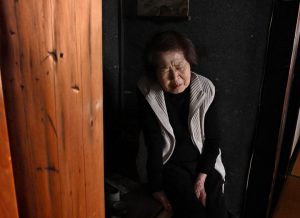Documenting Hiroshima—the Witnesses: Michiko Matsui, of “Ayumi Group,” implores people to remember those who lost parents in A-bombing
Apr. 3, 2025
by Michiko Tanaka, Senior Staff Writer
In the afternoon this day, Michiko Matsui, 89, a resident of Hiroshima City’s Minami Ward, stood in a kitchen worn by time, making coffee for her husband, 96, at their home, built more than 90 years ago, that had withstood the blast from the atomic bombing. This year marks the couple’s 54th wedding anniversary. Now, time passes slowly for her.
Ms. Matsui explained, “I didn’t intend to speak any more about the atomic bombing.” She has avoided watching television programs about the bombing, not wanting to recall her own experiences. Ever since the Japan Confederation of A- and H-Bomb Sufferers Organizations (Nihon Hidankyo) was awarded the Nobel Peace Prize last year, however, she has been aware only of a celebratory mood. Rather than joy, she began to experience feelings that could be described as impatience or frustration.
She wondered whether the misery experienced by those who survived the atomic bombing in their lives after the war had been forgotten. She decried how some of her acquaintances had died of leukemia later or still today suffer psychological scars from the bombing.
Mrs. Matsui was a member of the so-called “Ayumi Group,” which was formed 10 years after the atomic bombing by young people who had lost parents in the atomic bombing. The catalyst for the group’s foundation took place in 1955, when she and others submitted their personal accounts of experiences in the atomic bombing in response to a call by a group designed to support A-bomb orphans in Hiroshima City. The Ayumi Group was established in October that year, made up of a collection of eight people in Hiroshima.
A common theme in their personal accounts was the story of how they survived the 10 years since the atomic bombing. The Chugoku Shimbun featured some of those accounts in a series published in its morning edition starting on July 25, 1955. Ms. Matsui’s personal account was carried in the newspaper on July 26, with a profile that read, “Ms. B, 19, unemployed, Hiroshima City.” She wrote, “On August 6, I lost my irreplaceable father, mother, and grandfather, from both heaven and earth, due to the atomic bombing.”
(Originally published on April 3, 2025)
In the afternoon this day, Michiko Matsui, 89, a resident of Hiroshima City’s Minami Ward, stood in a kitchen worn by time, making coffee for her husband, 96, at their home, built more than 90 years ago, that had withstood the blast from the atomic bombing. This year marks the couple’s 54th wedding anniversary. Now, time passes slowly for her.
Ms. Matsui explained, “I didn’t intend to speak any more about the atomic bombing.” She has avoided watching television programs about the bombing, not wanting to recall her own experiences. Ever since the Japan Confederation of A- and H-Bomb Sufferers Organizations (Nihon Hidankyo) was awarded the Nobel Peace Prize last year, however, she has been aware only of a celebratory mood. Rather than joy, she began to experience feelings that could be described as impatience or frustration.
She wondered whether the misery experienced by those who survived the atomic bombing in their lives after the war had been forgotten. She decried how some of her acquaintances had died of leukemia later or still today suffer psychological scars from the bombing.
Mrs. Matsui was a member of the so-called “Ayumi Group,” which was formed 10 years after the atomic bombing by young people who had lost parents in the atomic bombing. The catalyst for the group’s foundation took place in 1955, when she and others submitted their personal accounts of experiences in the atomic bombing in response to a call by a group designed to support A-bomb orphans in Hiroshima City. The Ayumi Group was established in October that year, made up of a collection of eight people in Hiroshima.
A common theme in their personal accounts was the story of how they survived the 10 years since the atomic bombing. The Chugoku Shimbun featured some of those accounts in a series published in its morning edition starting on July 25, 1955. Ms. Matsui’s personal account was carried in the newspaper on July 26, with a profile that read, “Ms. B, 19, unemployed, Hiroshima City.” She wrote, “On August 6, I lost my irreplaceable father, mother, and grandfather, from both heaven and earth, due to the atomic bombing.”
(Originally published on April 3, 2025)








